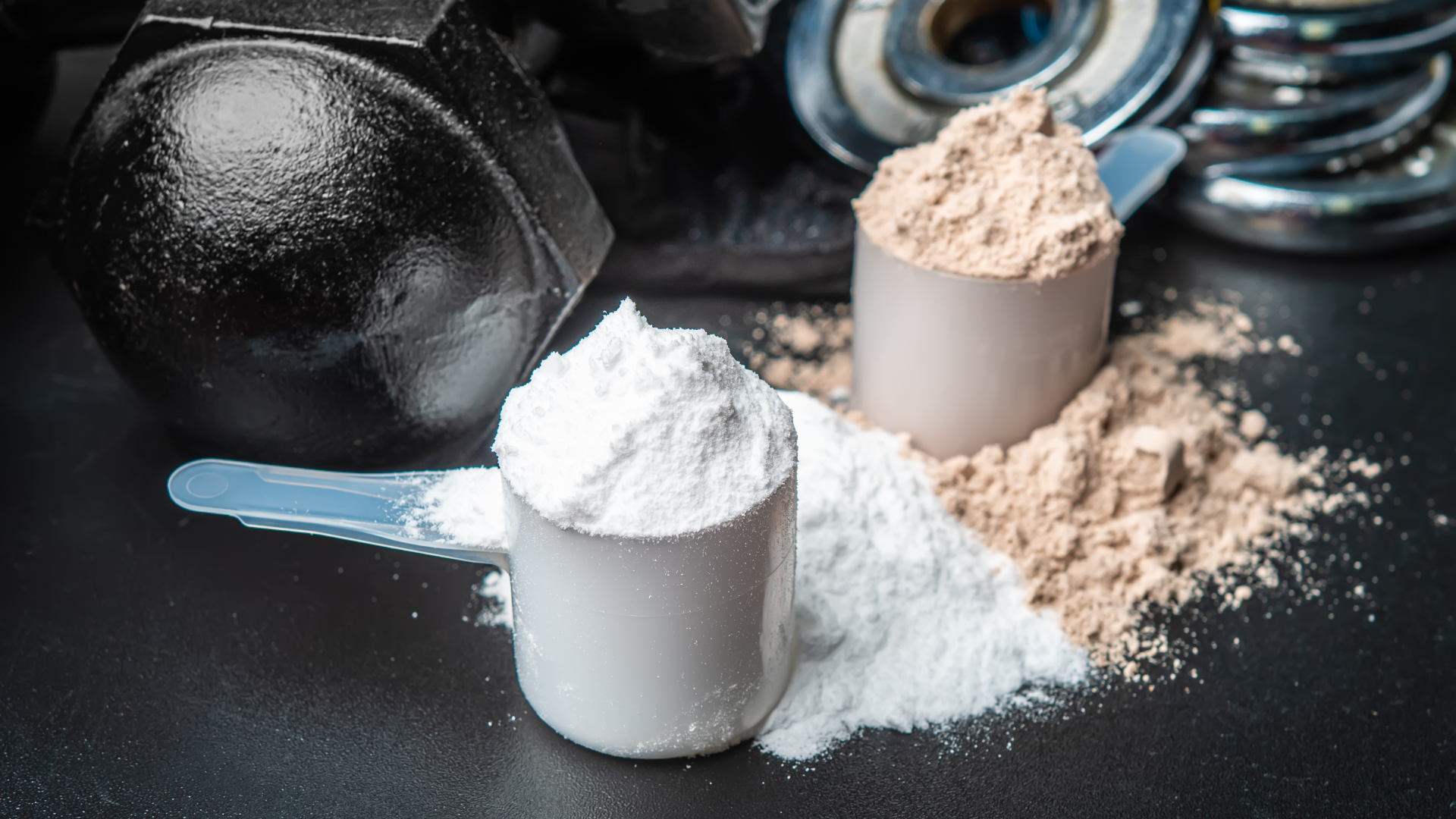When working out and going through an exercise program to help you build muscle, consuming more protein through protein powder can be a fantastic, effective way to easily get the extra amounts you need.
Protein is vital for muscle growth, recovery, and performance, so if you want to reach your full athletic potential, protein powder is one of the best ways to increase your consumption.
That said, what are your options if you're living a lifestyle that forbids animal-based products?
Protein is found in various food sources, both in meat and plant life, meaning that those eating a vegan diet can easily get enough protein from sources that suit their diet. However, if you want a convenient way to consume extra protein, you must first check if your protein powder is vegan.
While there are always rumours about whether a vegan diet deprives you of sufficient protein for muscle growth, this doesn’t have to be the case.
When you identify vegan protein supplements you can take, you will never have to worry again about whether you are getting enough protein every day.
Is protein powder vegan?
This is everything that you need to know:
What types of protein powder are vegan?
Protein powder isn't a single, universal product. The truth is that various types of protein powder use their own particular ingredients to help you increase your protein intake.
Countless different types exist, so it's impossible to say if protein powder is universally vegan. Some varieties will contain animal products, while others won't.
This is why it's best to break down all kinds of protein powders to fully understand what types best suit you. Below is a detailed look at all the different types of protein powder available on the market. There are various ways to source and create protein powder, leading to why there are such varied and diverse types of protein that you can get.
In addition to some being vegan and others not, you also need to consider each type's properties to ensure that it suits your goals and needs.
For example, some protein powder focuses on helping muscle growth, whereas others aim to promote fullness and deliver plenty of amino acids.
Understanding what each type of protein powder is tailored for, in addition to its vegan status, ensures that you can make informed decisions about which ones are best for you and your fitness goals.
As well as having a variety of ingredients, protein powders can be presented and sold in a number of different forms.
The most common type is protein concentrates.
This is where the protein is extracted from the source by using heat and acid. This type of protein powder will usually be 60-80% protein, with the other percentage being made up of fat and carbs.
You can also get protein isolates.
These are where concentrated protein powder goes through an additional filtering process that removes the excess fats and carbs.
Protein isolates have a much higher concentration of protein, usually 90-95% and are a great way to add protein without adding too many other macros. As more processing has been put into these protein powders, they'll usually be more expensive.
Finally, you can also get protein hydrolysates. These are similar to protein concentrate powder - however, they have been further headed with acids or enzymes to break down the bonds between the amino acids. This allows the protein to be absorbed and digested more easily, helping for quick recovery.
All of the different types of protein can come in these varied forms, so check to ensure you're using one that works best for you.
Here are the top seven most common sources of protein powder:
Please note: we are only saying that these products can be vegan based on the core ingredients. You will need to check each individual product as some manufacturers will use ingredients that are from animal sources.
Whey Protein: Not Vegan

Whey protein is one of the most common and widely consumed types of protein powder, thanks to its relative cost and effectiveness. It comes from milk, which is why it's not suitable for vegans and appears during the cheese-making process.
You find whey protein in the liquid that separates from the curds when making cheese, and because of it appearing in the process, it's also high in lactose if it's in its concentrated form.
Not only does this make it unsuitable for vegans, but it can also be an issue for people who are lactose intolerant and may struggle to process it.
However, getting the isolated version of whey protein will contain much less lactose as it will be lost when the milk sugar is removed during processing.
The body quickly digests whey protein, ensuring it's a fast-releasing protein. It has plenty of branched-chain amino acids, such as Leucine, which helps greatly when recovering from resistance or endurance training.
They're also ideal for muscle growth because they quickly become available for muscle protein synthesis, helping your body create more muscle. In terms of building overall muscle mass, whey is easily one of the most effective, as it can increase muscle protein synthesis 31% more than soy protein and 122% more than casein protein.
These muscle-building properties make whey one of the most common and used supplements in fitness training.
Pea Protein: Vegan

Pea protein is the most popular type of plant-based protein powder and is often used by vegetarians, vegans and people who may be sensitive to dairy.
Although called pea protein, it's actually made from a legume called the yellow split pea, not the garden peas you can buy in the supermarket. The yellow split pea is a great fibre source and contains all the essential amino acids, something that not all plant-based protein sources can say.
The protein from this legume is absorbed slower than whey protein but faster than other alternatives, making it a good compromise if you cannot use whey. It can also make you feel full, thanks to how it releases certain hormones in your body.
In terms of muscle growth and body composition, pea protein powder performs similarly to whey protein, meaning that you're not giving up much when using this vegan-friendly alternative.
It is a newer form of protein powder, so although it's safe and can be effective, its full effects and strengths are still being explored and discovered.
Casein Protein: Not Vegan
Like whey protein, casein is also found in milk during cheese-making but is different from whey.
Why?
Because it is digested much more slowly in your body, essentially, when it interacts with your stomach acid, it forms a gel that slows down the process of emptying your stomach.
As a result, you will likely feel full for longer, which prevents you from overeating. This makes it a valuable type of protein powder if you're cutting and need to stick to a nutrition plan with a deficit.
Like whey, this type of protein powder is unsuitable for vegans because it comes from cow milk, and it could be better if you have a lactose intolerance.
The release of protein is much slower in casein, which can reduce the rate of your muscle protein from breaking down. Health experts recommend consuming casein before going to bed, as it gives your body plenty of time to digest it to reap the rewards when you rest fully.
Compared to whey, casein is best suited for those who are overweight and are trying to improve their body composition through resistance training when calories are restricted.
Hemp Protein: Vegan

Hemp protein is another great plant-based option suitable for vegans, but it's a much newer option and is only now gaining popularity. Hemp is related to cannabis. However, it does not contain any psychoactive components known as THC, making it safe to use and consume.
Hemp is very different from the other types of protein powders on the market, as it contains a high amount of omega-3 fatty acids, which can improve brain function. As well as this, it also has several amino acids. However, it doesn't contain all the nine essential amino acids we need, meaning it's not a complete protein.
People turn to hemp protein because it's well-digested in the body, making it easier to break it down once consumed. Its fat content can also help users feel fuller, but it could be more effective at helping you build muscle when compared to other options on the market.
More research is needed on this emerging option to understand its effectiveness fully, but it's a useful option for vegans who want to start using protein powder.
Egg Protein: Not Vegan

Eggs may be vegetarian-friendly, but as they're an animal product, the protein powder derived from this source isn't suitable for vegans. Still, egg protein is a great alternative to the more popular options and can be a great place to get high-quality protein.
Out of all the whole foods available, eggs have the highest amount of protein digestibility-corrected amino acid score. This means that no other food with protein is as easily digested in the body, meaning that eating eggs is highly unlikely to upset your stomach.
Egg-based protein powder is great for decreasing your appetite and can help you feel full for longer, which is great if you want to limit the amount of snacking you do between meals. This is further improved if you take egg protein powder with fibre.
That said, egg protein powder won't be as effective at keeping you full as just eating an egg would. This is because the protein is taken from the egg whites, meaning the high-fat yolk has been removed. Despite that, the protein quality is still excellent in egg protein powder, as it contains all nine essential amino acids that your body can't make itself. All animal products contain all these amino acids, which is why they're more popular than plant-based options.
It's also fantastic at helping you build muscle and only ranks behind whey in that category. Although unsuitable for vegans, those with a dairy allergy still want animal protein can turn to egg protein powder as the solution.
Brown Rice Protein: Vegan

Brown rice protein has been a vegan-friendly product for some time, but it's often been disregarded because it's not as effective at building muscle as other options like whey.
It contains all the essential amino acids, but the lysine levels are too low to be considered a complete protein.
When used alongside weight training, it can help you increase performance and help you build mass, but it will be at a slower rate than other proteins. It's something you can use and add to your diet, but there are better vegan options out there, such as pea protein, soya, and even hemp.
Mixed Plant Proteins: Vegan

Mixed plant protein is the best option for vegans who want to feel all the benefits of all the different protein sources. These powders include protein obtained by various plants, allowing all their properties to combine so that you get a complete protein powder product.
Mixed plant proteins aim to ensure you have enough of each essential amino acid. Although many of the plants are not complete proteins on their own, when combined, the protein powder will give you all the benefits you need.
Usually, a mixed plant protein powder will have two or more of the following:
- Brown rice
- Pea
- Hemp
- Chia seeds
- Flax seeds
- Quinoa
The thing with mixed plant proteins is that they digest slower than animal-based proteins, thanks to the high fiber count. This can limit the number of amino acids your body can use once you're done exercising, affecting your recovery.
The best type of vegan protein powder
It depends on what you are looking for, but if you are adamant about sticking to vegan protein powder, you will automatically eliminate options. However, you’ll likely want to go for vegan, hemp, rice of mixed plant protein.
Again, this is general guidance, and you will need to check individual products and manufacturers to ensure that they are fully vegan.
There is a protein for everyone
As there are different types of protein powder on the market, everyone should have an option, regardless of diet restrictions and desired goals.
Although all will help you build muscle and recover well after exercise, some will also have additional benefits you may be looking for. Vegans don't have to compromise thanks to products like mixed plant protein or pea protein.



